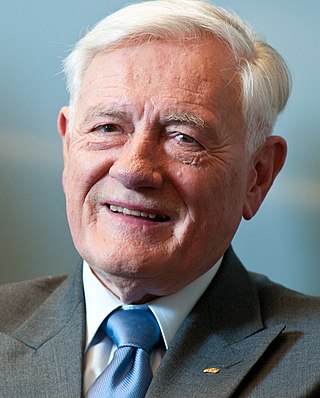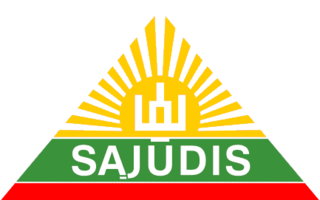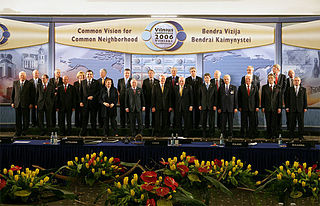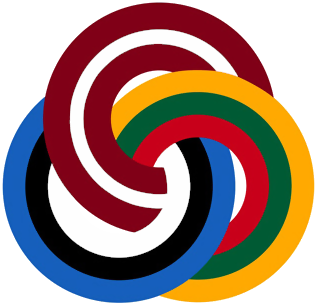The Community of Democratic Choice Youth Forum (CDC Youth Forum) is an international organization registered in Riga, Latvia. It aims to promote partnership and dialogue among youth from the region of the Community of Democratic Choice.
Founded under the name Youth Forum of Europe's New Democracies, it arose from a youth forum that was part of the Vilnius Conference 2006 of the Community of Democratic Choice. The youth forum consists of members from Armenia, Azerbaijan, Belarus, Slovenia, Bulgaria, Estonia, Germany, Georgia, Latvia, Lithuania, Moldova, Poland, Romania, Russia, Ukraine and United Kingdom. The main task of the forum is the promotion of democracy, human rights and the rule of law. [1]
In March 2007, delegates of the forum met in Tallinn, Estonia to institutionalize the forum and it was renamed into Community of Democratic Choice Youth Forum.
For their meeting in Vilnius, Lithuania the head of states of the Community of Democratic Choice (CDC) added an intellectuals' forum, an NGO forum and a youth forum to their summit. The youth forum was composed by 27 young Europeans from 13 countries. In its resolution it declared the foundation of the "Youth Forum of Europe's New Democracies". Nine month after the first meeting delegates of the forum met in Tallinn, Estonia to institutionalize the forum and give it a legal basis. By this the forum changed its name to CDC Youth Forum to stress out the ties to the Community of Democratic Choice.
The Forum wants to inform about the CDC, its values and goals among a broader public. Thus it tries to promote and strengthen democratic values, human rights and civil society in the region of the CDC. Under the label of "Your Voice" it seeks comprehensive discussions about democracy and its values among youth via a dialogue among youth.

The European Youth Parliament is a politically unbound non-profit organisation, which encourages European youth to actively engage in citizenship and cultural understanding. It involves 50,000 youngsters from all around Europe in its events and has around 6,000 active members in the different countries. It was established in 1987 in Fontainebleau, France.

The Singing Revolution was a series of events from 1987 to 1991 that led to the restoration of independence of the three Soviet-occupied Baltic countries of Estonia, Latvia, and Lithuania at the end of the Cold War. The term was coined by an Estonian activist and artist, Heinz Valk, in an article published a week after the 10–11 June 1988 spontaneous mass evening singing demonstrations at the Tallinn Song Festival Grounds.

Valdas Adamkus is a Lithuanian politician, diplomat and civil engineer who served as the fifth and seventh president of Lithuania from 1998 to 2003 and again from 2004 to 2009.
European integration is the process of industrial, economic, political, legal, social, and cultural integration of states wholly or partially in Europe or nearby. European integration has primarily come about through the European Union and its policies.

The Model European Parliament (MEP) is an international simulation of the working of the European Parliament for students aged 16–19. The aim of the programme is to give young people an insight into the workings of the European Parliament and raise their awareness of European citizenship. Two sessions are held each year, each involving 180 secondary school students.

Sąjūdis, initially known as the Reform Movement of Lithuania, is a political organisation which led the struggle for Lithuanian independence in the late 1980s and early 1990s. It was established on 3 June 1988 as the first opposition party in Soviet Lithuania, and was led by Vytautas Landsbergis. Its goal was to seek the return of independent status for Lithuania.

Russians in the Baltic states is a broadly defined subgroup of the Russian diaspora who self-identify as ethnic Russians, or are citizens of Russia, and live in one of the three independent countries – Estonia, Latvia, and Lithuania. As of 2021, there were nearly 900,000 ethnic Russians in the three countries, having declined from ca 1.7 million in 1989, the year of the last census during the 1944–1991 Soviet occupation of the three Baltic countries.

The Atlantic Treaty Association (ATA) is an umbrella organization which draws together political leaders, academics, military officials, and diplomats to support the North Atlantic Treaty Organization (NATO). The ATA is an independent organization that is separate from NATO.

The Community of Democratic Choice is an intergovernmental organization established on 2 December 2005, by nine states of Northern, Central and Eastern Europe in Kyiv, Ukraine. It was mainly signed by countries from the region between the Baltic, Black Sea and Caspian Sea. Its main task is to promote democracy, human rights, and the rule of law throughout the region.

The Baltic Assembly (BA) is a regional organisation that promotes intergovernmental cooperation between Estonia, Latvia, and Lithuania. It attempts to find a common position in relation to many international issues, including economic, political and cultural issues. The decisions of the assembly are advisory.

Vilnius Conference 2006: Common Vision for Common Neighborhood brought together delegations from the Baltic and Black Sea regions to discuss common interests and reinforce their commitments to the advancement of democracy and common values in their respective regions. The Conference took place in Vilnius, the capital of Lithuania, and was hosted by the President of Lithuania, Valdas Adamkus.

The inaugural session of the Black Sea Forum for Partnership and Dialogue (BSF) was held on June 4–6, 2006 in Bucharest. The Forum is a Romanian initiative, initially meant to hold annual presidential-level summits and thematic or sectoral-cooperation meeting during those annual intervals. The Forum is not meant to create new regional institutions, but rather to turn into a regular consultative process among countries of the extended Black Sea region and between this group of countries and international organizations such as the European Union. After the inaugural summit, no other summits were planned.

Estonia–Russia relations are the bilateral foreign relations between Estonia and Russia. Diplomatic relations between the two countries were established on 2 February 1920 after the Estonian War of Independence ended in Estonian victory with Russia recognizing Estonia's sovereignty and renounced any and all territorial claims on Estonia.

Baltic Pride is an annual LGBT+ pride parade rotating in turn between the capitals of the Baltic states; Tallinn, Riga and Vilnius. It is held in support of raising issues of tolerance and the rights of the LGBT community and is supported by ILGA-Europe. Since 2009, the main organisers have been Mozaīka, the National LGBT Rights Organization LGL Lithuanian Gay League, and the Estonian LGBT Association.
Ina Marčiulionytė is the Ambassador and Permanent Delegate of the Republic of Lithuania to UNESCO at the headquarters in Paris and has served in that post since 2003. Since 2007, she also serves as Vice-President of the UNESCO Executive Board. Since September 2015, Marčiulionytė is Lithuanian Ambassador in Beijing.

The Soviet Union (USSR) occupied most of the territory of the Baltic states in its 1944 Baltic Offensive during World War II. The Red Army regained control over the three Baltic capitals and encircled retreating Wehrmacht and Latvian forces in the Courland Pocket where they held out until the final German surrender at the end of the war.

The Socialist People's Front is a left-wing political association in Lithuania formed in December 19, 2009, from a merger of the Front Party and Lithuanian Socialist Party. Held at Vilnius University, the party's foundation featured 102 delegates. The merger was approved by an affirmative vote of 96 delegates, with three against and one abstaining. The leader of the Lithuanian Socialist Party, Giedrius Petružis, refused candidacy for chairperson of the merged party, claiming a desire to return to academic life. The leader of the Front Party, Algirdas Paleckis, was unanimously chosen as the leader of the SPF.

Nordic-Baltic Eight (NB8) is a regional co-operation format that includes Denmark, Estonia, Finland, Iceland, Latvia, Lithuania, Norway, and Sweden. Under NB8, regular meetings are held of the Baltic and Nordic countries' Prime Ministers, Speakers of Parliaments, Foreign Ministers, branch ministers, Secretaries of State and political directors of Foreign Ministries, as well as expert consultations where regional issues and current international topics are reviewed.

Ingrida Šimonytė is a Lithuanian politician, public servant and economist who is the 17th and current prime minister of Lithuania since 11 December 2020. She has been a Member of the Seimas for the Antakalnis constituency since 2016 and was Minister of Finance in the second Kubilius cabinet from 2009 until 2012. Šimonytė was a candidate in the 2019 presidential election, but lost in the second round runoff to Gitanas Nausėda. She has been a member of Homeland Union since 2022, having previously been an independent politician.

The Lublin Triangle is a regional alliance of three European countries – Lithuania, Poland, and Ukraine – for the purposes of strengthening mutual military, cultural, economic and political cooperation and supporting Ukraine's integration into the European Union and NATO. The Lublin Triangle initiative invokes the integrative heritage of the 1569 Union of Lublin.